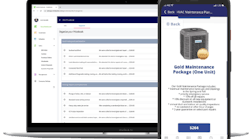Many companies are wondering if they need a smartphone app to increase their interaction with existing and potential clients. While this is a good goal, I think they also should be asking, “Is there a way to increase their productivity and client experience?”
By 2013, more people will use their smartphones to access the Internet than PCs, according to a Gartner research report on Smartphones. With the number of smartphones in the United States approaching 100 million, companies of all sizes are trying to figure out if they need an app or mobile website and, if so, which one is right for them. Many of us are familiar with mobile apps that take advantage of GPS to show specific locations on a map.
While this is a good start, I think they should go deeper. You can raise HVACR businesses' productivity simply by reminding your clients the day before they have an appointment. This can be accomplished in several ways — phone call, text message or email. But did you know all of these choices can be in one app where the customer decides which one he or she prefers? The more you can have your customers determine what is best for them, the more successful the app will be. An interesting statistic for smartphone users under 30 years old is they are 23 percent likely to read an email that is sent but are 95 percent likely to read a text message. If your customers are in this age group, you certainly want to communicate via text messaging.
Now let's take this example and demonstrate how you can help your dealers use apps so that they will rely on you for sales and advice. By keeping track of what a contractor's customers consume (i.e., last time the heater or air conditioner was serviced, age of system and possible current energy usage), they can be proactive and send out suggestions that remind customers they may need service now based on previous usage. The information is probably already stored in a database; by accessing it and setting up rules, they can be proactive with your customers while increasing your sales.
You also can tell your story. For example, you may have an offer that gives contractors six months to pay for a new inductor system where the monthly costs are less than the amount of money they save using an up-to-date energy-efficient system. By educating your dealers, you make a sale, and they get paid when you inform them about the new opportunity. With so many of us having our heads buried in our smartphones reading, playing games and surfing the web, it's convenient for them to read a text or an email that contains these offers. Also, while your dealers might be older than the 23-year-old average that Gartner cites, don't forget that as more service techs enter the industry, they will add to the overall number of smartphone users.
Educating your customers doesn't have to stop here. You can produce short videos that you place on YouTube and have your smartphone app select them based on the dealers' interest. For example, you can show one of your counter people replacing a new type of filter and why it's important to keep up with this maintenance. Another video might show the benefits of solar energy and how your company is uniquely qualified to help them with their installation information, financing and tax credits. I'm sure you can think of other topics that would keep dealers coming back while building loyalty for years to come.
When you communicate with your dealers via their smartphones, it is important to have them give you permission to send them information. This requires you to have a well-defined privacy notice stating that you will not use or sell their information in any way other than what they have agreed to. You also should give dealers the option to opt out of receiving further information from you and make it easy to do so. This is good etiquette and will keep you in good standing with the mobile community.
Now that you have some ideas on what a mobile app or mobile website can do for you, here are a few things to consider:
- What is the cost?
The cost will vary depending on the complexity of the app. Native apps can give a better customer experience but require each type of device (e.g., iPhone/iPad, Android and BlackBerry) to have a separate version since they are not compatible. A mobile site will not be as flexible, but you can obtain a design to work on all of the devices.
- Finding a vendor
You can search the web for vendors or ask your colleagues for recommendations. Either way, it is important to make sure the company you select has experience in what they are proposing. Have they already published on iTunes and Android marketplace? Do they have a portfolio of projects they've completed for other companies that they can demonstrate? How long have they been in business? Do they have existing clients you can contact to get feedback on how well they performed? Are they quick answering questions you pose before, during and after product development?
- Do you have time?
This is perhaps the most overlooked requirement by many small and medium-size businesses. You know your business better than anyone else; make sure the features of your app deliver the goals you set forth. You will need to meet with the developers. I recommend meeting weekly for one hour while the project is in the developmental stage. You can do this (without physically getting together) via a web meeting and conference call, where the developer does a show-and-tell while you follow along on your screen. Many people can attend a meeting like this, so you can get all the input you need from your staff. With no travel time involved, it makes setting up a meeting easy and requires the least amount of your time.
Taking advantage of the smartphone proliferation is a smart decision. Follow the above suggestions and you'll have a successful project that can increase your bottom line.
Glenn Smith is president of Micro Integration Services Inc., which specializes in creating apps for business giants such as AT&T as well as small and medium-size companies. Contact Glenn at [email protected], 800/667-9418 or visit www.misdb.com.







